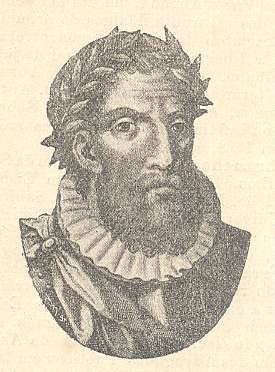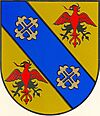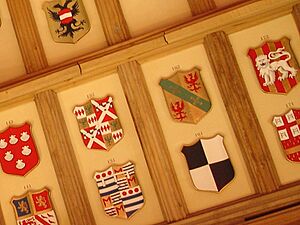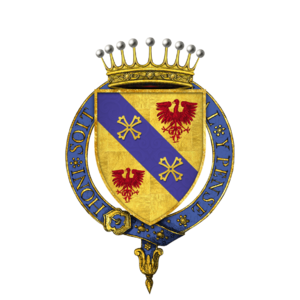Álvaro Vaz de Almada, 1st Count of Avranches facts for kids
Quick facts for kids
Álvaro Vaz de Almada
|
|
|---|---|
| Count of Avranches | |
 |
|
| Count of Avranches | |
| Coat of arms |  |
| Tenure | 4 August 1445 – 20 May 1449 |
| Successor | Fernando de Almada |
| Born | 1390 Kingdom of Portugal |
| Died | 20 May 1449 Alverca do Ribatejo, Portugal |
| Family | Almada |
| Spouse(s) | Catarina de Ataíde |
| Issue more... |
Fernando, 2nd Count of Avranches |
| Father | João Vaz de Almada |
Álvaro Vaz de Almada, 1st Count of Avranches (born around 1390 – died May 20, 1449) was a very important Portuguese knight and nobleman. He had a long and famous career, especially in England. The English king, Henry VI, made him the 1st Count of Avranches (which is Conde de Abranches in Portuguese). He also became a Knight of the Garter, a very special honor.
Álvaro Vaz de Almada was the main military leader of Lisbon. He sadly died during the Battle of Alfarrobeira in 1449. His picture was even on an old Portuguese five-escudo banknote. Sometimes, people mistakenly call him "Albro Vasques d' Almadea Earl of Averence".
Contents
Early Life and Family
Álvaro was one of the last people to use the old Portuguese title of rico homem, meaning a very important nobleman. His father was João Vaz de Almada and his mother was Joana Anes. The Almada family wasn't originally noble. They became rich through trading overseas.
Their family land in Almada was taken away during a big crisis in Portugal (1383–1385). However, Álvaro's father, João Vaz, was a brave soldier for King John I of Portugal. Because of his service, the family got some of their lands back and received new rewards. The family mostly lived in Lisbon and Algés. Álvaro had a younger brother, Pedro, and two half-siblings.
When he was young, Álvaro went to England with his father. They both fought in the Hundred Years' War. They became good friends with King Henry V of England. They returned to Portugal in early 1415.
A Brave Career
Conquest of Ceuta
Soon after coming back from England, Álvaro and his father fought in the conquest of Ceuta in 1415. Ceuta was an important city in North Africa. After the battle, the Portuguese prince Peter, Duke of Coimbra made Álvaro a knight. This event started a long and strong friendship between Álvaro and Prince Peter.
Admiral of Portugal
In June 1423, King John I of Portugal chose Álvaro to be the capitão-mor da frota. This meant he was the admiral of the sailing fleet. His job gave him a lot of power. He was basically in charge of the entire Portuguese navy.
Travels in Europe
In the late 1420s, Álvaro Vaz de Almada traveled across Europe with his friend, Prince Peter, Duke of Coimbra. They even fought against the Turks in Hungary. They were helping Emperor Sigismund. Álvaro returned to Portugal by 1433. His role as admiral was renewed. He also took part in some small naval battles near Ceuta. During the 1430s, King Edward of Portugal gave him more rewards. These included a share of the taxes collected from the Jews in the kingdom.
The Tangier Expedition
Álvaro Vaz de Almada was one of the leaders of the Tangier expedition in 1437. This expedition was led by Prince Henry the Navigator. It was a big failure. The Portuguese army tried to attack the walls of Tangier many times. But they were defeated and ran out of food. This happened because of the Marinid armies of Morocco. Even though it was a loss, Almada showed great bravery. He was one of the last men to leave the beach.
Supporting Peter of Coimbra
After King Edward died, there was a big political problem in Portugal (1438–39). Álvaro Vaz de Almada was one of the first to support Peter of Coimbra as regent. He helped gather many people to Peter's side. In September 1439, the people of Lisbon chose Almada as their main representative and leader. Because of his efforts, Peter, now the new regent, made Almada a member of his royal council. He also made him the alcaide-mor (governor) of the Castle of São Jorge in Lisbon in April 1440.
Honors from England

Álvaro Vaz de Almada returned to England after 1415 several times. On August 8, 1444, King Henry VI of England gave Álvaro Vaz de Almada a special honor. He made him the 1st Count of Avranches. Avranches was a town in France that was still under English rule. This title was called Conde de Abranches in Portuguese. The king gave him this title because of his excellent service to both King Henry V and King Henry VI.
At the same time, in 1445, he became the 162nd Knight of the Most Noble Order of the Garter. This is a very famous English knightly order. Almada was one of the few foreigners who were not kings or princes to join this special group. He was also the only Portuguese person to receive a noble title from England that could be passed down in his family. King Henry VI also gave Almada a yearly payment and a gold cup filled with gold.
Stories about Almada's time in England became part of a popular Portuguese legend. This legend is called "the Twelve of England" (Os Doze de Inglaterra). It was made famous by the writer Luís de Camões in his poem Os Lusíadas. The story says that twelve (or thirteen) Portuguese knights went to England. They went to defend the honor of some ladies. Almada is often said to be one of these knights. However, the legend is set around 1390, when Almada was just a baby. So, it's more of a fun story than a historical fact.
The Battle of Alfarrobeira
In 1448, King Afonso V of Portugal became old enough to rule on his own. He ended the regency (when someone else rules for the king) of Peter of Coimbra. However, King Afonso V was influenced by Afonso of Barcelos-Braganza. The king immediately started to undo all of Peter's decisions. He also removed all of Peter's appointed officials. This often involved unfair legal actions to take away their property. These nobles and officials then turned to Peter for help.
Álvaro Vaz de Almada was in Ceuta at the time. He returned to Portugal in September 1448 to support his friend Peter. Because he dared to speak up for Peter in court, Almada lost his position as governor of Lisbon in December 1448. Almada made the king even angrier. He led some of Peter's men to Coja. This was to stop Afonso of Barcelos-Braganza from passing through Peter's lands. Even though Afonso had more soldiers, he knew Almada was a great military leader. So, Afonso chose to take a longer route instead of fighting.
In May 1449, Peter of Coimbra and Almada left Coimbra. They led their men towards Lisbon. Peter said it was a peaceful march. He wanted to demand that he and his dismissed officials be allowed to defend themselves in court. But Afonso of Barcelos-Braganza warned the king. He said Peter and Almada planned to attack Lisbon. He also said they would likely cause an uprising in the city. King Afonso V became worried. He declared them rebels and traitors. He then set out with his army against them. Almada's own half-brother, João Vaz de Almada, was even in the king's army.
The two armies met on May 20, 1449, at the Battle of Alfarrobeira. This battle took place near Alverca do Ribatejo. It is said that Peter and Almada had promised each other they would not survive if the other died. Peter was killed early in the battle. Almada heard the news from a young page. He told the page not to tell the rest of the army. Then, after a short rest, Almada, who was in his fifties, bravely went into the middle of the fight.
Soon, the king's soldiers recognized him and surrounded him. But Almada refused to give up. He fought off everyone who came near him. Finally, he was exhausted. He famously said, "My body, I feel you can no more; and you, my soul, already delay." He then lowered his weapon and fell. His last words were, "now indulge yourselves, villains." His enemies then attacked him and killed him.
Even after his death, legal actions continued against Almada. Much of his property was taken away. His family home in Algés went to his half-brother, João Vaz de Almada. Most of his other property was given to the king's advisor.
Almada's wife, Catarina de Castro, was only allowed to keep their homes in Lisbon. She also kept the taxes from the Jews. Almada's oldest son, João de Abranches, inherited what was left of his father's older properties. These were lands that the king could not take away.
The title of 2nd Count of Abranches was eventually recovered by Fernando de Almada. He was the only son from Almada's second marriage to Catarina de Castro.
Family Life
Álvaro Vaz de Almada was married two times.
His first marriage was to Isabel da Cunha. They had these children:
- Dom João de Abranches (born around 1420). He married twice and had children from his second marriage.
- Dona Leonor da Cunha, who became a Nun.
- Dona Violante da Cunha (born around 1430). She married Dom Fernão Martins Mascarenhas. They had no children.
- Dona Isabel da Cunha (born 1420). She married Álvaro Pessanha and had children.
- Dona Brites da Cunha, who married an English nobleman.
Isabel da Cunha died before Almada became the Count of Avranches. However, their oldest son, João, used "Abranches" in his name. But he did not inherit the title.
His second marriage was to Dona Catarina de Castro on August 4, 1445. She was the daughter of Dom Fernando de Castro. They had one son:
- Fernando de Almada, 2nd Count of Avranches (born around 1430, died April 29, 1496). He married Dona Constança de Noronha in 1463 and had children. He also had two children outside of marriage.
Almada's second wife, Catarina de Castro, later married her cousin. They did not have any children together.
Sometimes, the Avranches/Abranches family is confused with other families. These other families are named after "Abrantes", a town in Portugal.
External sources
- Knights of the Garter, Roglo
See Also
- Battle of Alfarrobeira
- Peter, Duke of Coimbra
- Henry VI of England
 | Aurelia Browder |
 | Nannie Helen Burroughs |
 | Michelle Alexander |


